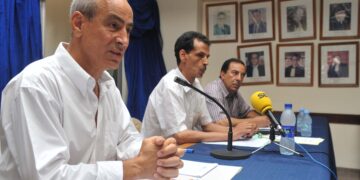Secretary Blinken breaching Leahy Law, manufacturing loopholes to avoid accountability for Israel
(Washington, DC – April 30, 2024): The U.S. State Department should suspend U.S. foreign military assistance to the Netzah Yehuda Battalion immediately and investigate all Israeli military units receiving U.S. military funding in light of extensive evidence of widespread and systematic human rights violations, said DAWN today.
Secretary Blinken has undermined and avoided enforcement of the Leahy Law to sanction abusive Israeli units by creating new bureaucratic procedures to allow Israel additional time to remediate abuses, despite failing to do so for at least two years.
"According to the State Department's own procedures and the recommendations of its most senior staff, Secretary Blinken should have blacklisted the Netzah Yehuda Battalion at least a year ago," said Sarah Leah Whitson, DAWN's executive director. "Secretary Blinken is undermining the black letter rules of our own laws by inventing new, procedural, delaying tactics to avoid sanctioning even a single Israeli unit."
The Unremediated Netzah Yehuda Battalion
On April 29, 2024, the State Department announced that it had determined that five Israeli security units committed gross violations of human rights. It assessed that four of the units "have effectively remediated these violations." But the State Department said that Secretary Blinken is "still deciding" whether to restrict military assistance to the fifth unit, the Netzah Yehuda unit, claiming that the State Department continues to be in consultations after Israel submitted "new information" about the unit just days before the sanctions were to be announced. Previous reports revealed that the Israel Leahy Vetting Forum had recommended sanctioning the Netzah Yehuda Battalion last year given Israel's failure to remediate its abuses. Normally, the State Department would suspend aid to a unit found to have committed unremediated abuses and then consider removing the suspension if new information showed meaningful remediation.
DAWN previously called on the State Department to make the Netzah Yehuda unit ineligible for assistance in 2022 for its well-documented record of abuse against Palestinian civilians and highlighted the Israeli government's failed accountability and whitewashing efforts in 2023. As DAWN detailed, in January 2022, soldiers from Netzah Yehuda detained, bound, gagged, blindfolded and abandoned 78-year-old Palestinian-American Omar Assad, leaving him to die in an abandoned construction site. An autopsy determined the soldiers' abusive treatment caused him to suffer a fatal heart attack. An Israeli military investigation attempted to whitewash the unit's role in abuses but found no criminal wrongdoing.
Netzah Yehuda soldiers have also been implicated in the unjustified killings of at least two other unarmed Palestinians, Iyad Zakariya Hamed and Qassem Abbasi, as well as numerous cases of torture, assault and sexual abuse between 2015 and 2022. In almost no cases have soldiers or commanders faced any meaningful accountability, and the unit's culture of abuse and impunity continue.
Secretary Blinken also should be fully transparent about the other four Israeli units it determined has engaged in gross violations of human rights and the basis for the Department's claim that Israel has remediated their abuses. None of this information has yet been made public or shared with Congress in accordance with the clear requirements of the Foreign Assistance Act.
The Leahy Laws and Remediation of Abuses by Abusive Foreign Units
Secretary Blinken's failure to sanction the Israeli Netzah Yehuda Battalion appears to violate the joint policy on remediation and resumption of assistance under the Leahy Laws, as explained in a 2015 Defense Department memorandum explaining the process of "remediation." The memo clearly states that once the Departments of Defense and State determine there is credible information that a unit has committed a gross violation of human rights and the unit has not taken appropriate remediation measures, the U.S. must suspend assistance to that unit. Secretary Blinken's decision to continue "reviewing" the Netzah Yehuda Battalion's eligibility, even after the State Department concluded the unit committed gross human rights abuses and failed to effectively remediate them, goes against the established policy.
"Secretary Blinken's delay and continued engagement with Israel regarding this unit, despite the State Department's own conclusions, violates both the letter and spirit of the joint policy on implementing the Leahy Laws," said Raed Jarrar, DAWN's advocacy director. "There is no such thing as an open-ended back and forth with a recipient state to get new information about their units accused of gross violations of human rights. The process is clear: secretary Blinken must blacklist the Netzah Yehuda unit now, then consider additional information for delisting the unit moving forward."
The 2015 memo outlines a specific process for evaluating whether a unit remains eligible for assistance. This involves convening a Remediation Review Panel (RRP) within 14 days of receiving a request and endorsement from the relevant staff. The RRP reaches consensus that the unit does not meet remediation standards, the policy dictates that assistance should be suspended. Only if the RRP cannot reach consensus is the matter elevated to higher levels for review.
In the case of Israel, the State Department created different, legally dubious, policies departing from the 2015 memo procedures. In 2020, it created the so-called "Israel Leahy Vetting Forum" which provides Israel 90 days, instead of the 14 days required in the memo,to remedy abuses. Even after exhausting the exceptional Israel-only 90-day remediation policy, Secretary Blinken's statement that he is still assessing the Netzah Yehuda Battalion's eligibility and giving Israel more time for remediation while continuing to provide assistance is a clear violation of the policy.
While the law allows for the Secretary of State to continue funding foreign security units involved in gross violations of human rights in cases of remediation, that exception comes with a requirement: Section §2378d of the Foreign Assistance Act requires the Secretary of State to submit a report to the Committee on Foreign Relations of the Senate, the Committee on Foreign Affairs of the House of Representatives, and the Committees on Appropriations explaining how, in this case, the government of Israel has taken effective measures to bring the responsible members of the security forces unit to justice.
Structural Impediments to Enforcing Accountability for Aid to Israel, Widespread and Systematic Abuses
The failure to enforce the Leahy Laws with respect to Israel over the past two decades highlights the unique structural impediments the State Department has created to shield Israel from accountability without meaningful transparency. For almost all countries around the world, the process by which the State Department applies the Leahy Law is to vet each military unit of a foreign country for which aid is requested before providing it with military assistance. The State Department does a case-by-case review of each relevant unit for credible evidence of gross violations of human rights, and if it deems such evidence credible, it does not provide the unit with assistance. The State Department then informs the partner government of the designation, and pushes the partner to take steps to remediate the unit – a process that normally takes years before it lifts the designation.
For Israel, however, the State Department provides the country with the entirety of its foreign military financing in the first thirty days of the fiscal year with no front-end vetting of military units whatsoever. The State department also provides Israel with a substantial portion of its military aid, estimated at 20% of aid this year, as untraceable cash through the Overseas Procurement (OSP) mechanism. As a result, the U.S. cannot determine which Israeli units are receiving its aid. This by itself violates section 620M(d)(1) of the Foreign Assistance Act, which requires the State Department to maintain a current list of all units receiving U.S. assistance so it can vet such units in advance.
The failure to vet Israeli units in advance is particularly problematic in the face of extensive documentation of war crimes, crimes against humanity, and plausibly genocidal actions in Gaza by Israeli security forces, which are currently the subject of investigations by the world's two leading international courts, the International Court of Justice and the International Criminal Court. In addition, on April 22, 2024, the State Department released its annual human rights report for Israel, which included damning documentation of gross violations of human rights by Israeli forces, such as extrajudicial killings, torture, arbitrary detention, serious restrictions on free expression, and crimes involving violence targeting minority groups.
"With hundreds of IDF units implicated in extensively-documented abuses, the State Department should dramatically overhaul its provision of military aid to Israel to ensure that taxpayer-funded weapons are not in the hands of known Israeli abusers," said Josh Paul, DAWN's senior advisor. "What we see across the Israeli security forces is a systematic pattern of violations of human rights, supported by a political leadership that endorses – indeed, often praises, these violations, and protected by a military justice system that multiple Israeli legal authorities have said is not credible when it comes to holding Israeli forces accountable."
Earlier this month, DAWN announced it was launching the "Leahy Law Accountability Project." The project is a comprehensive effort to ensure that the U.S. government adheres to its own laws and stated values in its military assistance to Israel. It will rely on advocacy, public engagement, and strategic litigation to challenge the State Department's failures in enforcing the Leahy Law with respect to Israel. By mobilizing congressional support, raising public awareness, and pursuing legal action, the project aims to hold the U.S. government accountable for its failure to properly implement this critical human rights law.







































